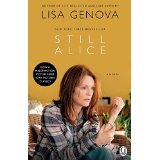By now I i magine most of you reading this have heard of Still Alice by Lisa Genova, or at least the movie based on it starring Julianne Moore as a linguistic professor who is diagnosed with early-onset Alzheimer’s Disease.
magine most of you reading this have heard of Still Alice by Lisa Genova, or at least the movie based on it starring Julianne Moore as a linguistic professor who is diagnosed with early-onset Alzheimer’s Disease.
I always have my eye open for non-textbook materials for students to read in my Mental Health and Aging class so my read of this book was with that in mind. I have relied on chapters from Mental Disorders in Older Adults (Zarit and Zarit, 2011) and The Alzheimer’s Project from HBO Documentary Films. Zarit and Zarit provide excellent clinical material, in particularly useful insights on when memory loss is normal and when it’s a sign of a larger problem. The Alzheimer’s Project includes a series of films about the science behind ongoing research on Alzheimer’s; profiles of individuals with Alzheimer’s, their families, and the many challenge they face; and a variety of supporting materials.
Still Alice is definitely a candidate to add to the list next time I teach this class. Why? For one, it’s a quick, easy, and engaging read that would provide a nice complement to Zarit and Zarit.
Second, the story focuses on early-onset Alzheimer’s. While less prevalent than later onset of the disease, it is equally devastating to the individual and his/her family and includes some different challenges. In particular, with onset in the 50s, 40s, or even earlier, it disrupts a different stage of life – mid- or even early- career, perhaps younger children, and a different orientation to the future.
Finally, it’s told from the perspective of the person with Alzheimer’s. To me this was one of the most compelling aspects of the book and Lisa Genova has clearly done her research. Watching from the inside as Alice declines, her efforts to cope, and her increasingly infrequent moments of clarity is gut wrenching. In her mind, her husband goes from John to that man in the chair or the man who owns the house, her daughter Anne becomes the Mother, and her daughter Lydia is the actress. Her thoughts repeat and twist back on themselves. Something that seems so important and monumental one moment is forgotten in the next when her attention is captured by something else. It’s this perspective that I think will make it a good addition to a syllabus. As social workers, we always try to start where the person is and empower them to the extent they are able, but it can be difficult to do when the individual has a hard time communicating. Having a window into where someone with Alzheimer’s is, even if that window is a fictionalized one, seems like it would be of great use to social workers and other health care professionals.

Leave a Reply